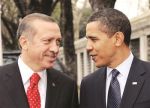Obama Made Turkey His Mid East Linchpin on US Intelligence Advice
Turkish Prime Minister Tayyip Erdogan bought his way into President Barack Obama’s graces as the key door-opener for his Middle East and Iran policies four months ago, by consenting to the deployment of the advanced US AN/TPY-2 radar station, part of the NATO missile shield against Iran, at the southeastern Turkish air base of Kurecik. The facility was set up to monitor Iran.
That willingness, said a US intelligence position paper recently put before President Obama, marked a major turning-point in US-Turkish relations. It demonstrated that Erdogan had resolved to turn away from the policy conceptualized by his foreign minister Ahmet Davutoglu, which was to go after solo supremacy as the senior Muslim Middle East power. By accepting the US radar station, the Erdogan government turned back to Ankara’s traditional strategic partnership with America and NATO, said the intelligence position paper.
According to DEBKA-Net-Weekly’s sources in Washington, the paper commended Turkey’s policy turnabout and recommended that the Obama White House designate Ankara its primary vehicle for reaching out to the ayatollahs in Tehran and to the regimes rising out of the convulsions of popular Arab revolts.
Khamenei harshly reprimands Erdogan on US radar
 Our Iranian sources disclose that while Ankara’s acceptance of the US radar scarcely raised a ripple in the West, it was important enough for Iran’s Supreme Leader Ayatollah Ali Khamenei to give the Turkish prime minister a harsh dressing-down when they met in Meshhad on March 29. Indeed it was their main topic of conversation.
Our Iranian sources disclose that while Ankara’s acceptance of the US radar scarcely raised a ripple in the West, it was important enough for Iran’s Supreme Leader Ayatollah Ali Khamenei to give the Turkish prime minister a harsh dressing-down when they met in Meshhad on March 29. Indeed it was their main topic of conversation.
When Erdogan handed over a message from President Obama (See DEBKA-Net-Weekly 535 of March 25: Same Obama Message for Putin and Khamenei: Give Me Space), Khamenei shot back: Why should I trust you and believe you or President Obama when you let the Americans after they were already out of Iraq tighten their military grip around Iran with a radar station in Kurecik.
“First you back up US preparations for attacking our nuclear program, then you come running to me as my liaison with Washington?”
The Iranian leader accused Erdogan of falsely promising to prevent the data collected by the station from reaching Israel and not to permit it to be connected to the Israeli radar link in the US anti-Iran missile shield located on Mount Keren in the Israeli Negev.
That link was actually tested operationally on Feb. 10 in a joint US-Israel missile interception test, Khamenei pointed out.
To clinch his grievance against Turkey, he cited the words of a high-ranking American officer at that test after a visit to Kurecik: “That radar is exclusively operated by US personnel, exactly as it is here,” said the American officer. “We will control the data and fuse it with data from other radars in the region to generate the most comprehensive and effective missile defense picture.”
So how can you promise me anything when Turkey doesn’t even control the US radar station on its soil? the Iranian leader asked Erdogan.
Steep decline in Iranian-Turkish ties compromises Erdogan mission
 Hoping to repair some of the damage to his credibility in Tehran, Prime Minister Erdogan as soon as he returned home went on Iran’s state television to announce he would ask the US to dismantle the radar if Turkey’s conditions for its operation were not met.
Hoping to repair some of the damage to his credibility in Tehran, Prime Minister Erdogan as soon as he returned home went on Iran’s state television to announce he would ask the US to dismantle the radar if Turkey’s conditions for its operation were not met.
Foreign Minister Davutoglu, who was with Erdogan in Tehran, said the Iranians had no quarrel with Turkey – only concerns about the American radar. He therefore stressed that no non-NATO member (Israel) would have access to the data it gathered. “Technically it is possible for us to leave the system in six months if we notice difference practices,” he said.
The US intelligence paper noted that Turkey had nonetheless stood up to Iranian pressure and the radar station was still functioning at the Turkish air base.
At the same time, relations between Ankara and Tehran have deteriorated badly over this very issue to the point of jeopardizing the prospects of nuclear diplomacy.
(See separate article in this issue: The Iranian Bazaar Opens for Business: Preconditions for Diplomacy)
Obama should help Erdogan overcome the Cyprus and Israel issues
The same US intelligence position paper, DEBKA-Net-Weekly’s sources say, also surveyed the close ties between Ankara and Moscow in favor of Iran.
It found Prime Minister Edrogan and President-elect Vladimir Putin closely coordinated with regard to Iran’s nuclear program down to the most detailed routine procedures.
President Obama was therefore advised to nurture his strategic rapport with the Turkish prime minister as a useful conduit through which to persuade Putin to turn around and support US policy on Iran.
For the sake of this rapport, the Obama administration’s intelligence advisers recommended urgent action to ease two of the Turkish leader’s headaches, the Israel and Cyprus issues.
The White House should therefore make serious efforts to resolve the bitter conflict between Ankara and Athens over the partitioning of Cyprus and appease the Turkish prime minister who has a deep grudge against Israel over the Palestinian issue.


